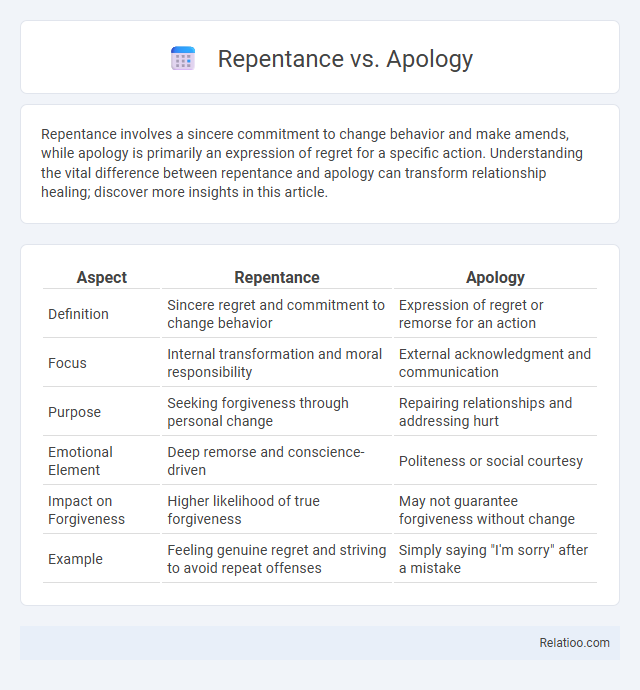Repentance involves a sincere commitment to change behavior and make amends, while apology is primarily an expression of regret for a specific action. Understanding the vital difference between repentance and apology can transform relationship healing; discover more insights in this article.
Table of Comparison
| Aspect | Repentance | Apology |
|---|---|---|
| Definition | Sincere regret and commitment to change behavior | Expression of regret or remorse for an action |
| Focus | Internal transformation and moral responsibility | External acknowledgment and communication |
| Purpose | Seeking forgiveness through personal change | Repairing relationships and addressing hurt |
| Emotional Element | Deep remorse and conscience-driven | Politeness or social courtesy |
| Impact on Forgiveness | Higher likelihood of true forgiveness | May not guarantee forgiveness without change |
| Example | Feeling genuine regret and striving to avoid repeat offenses | Simply saying "I'm sorry" after a mistake |
Understanding Repentance: A Deeper Transformation
Understanding repentance involves a profound inner transformation that goes beyond simply apologizing for a wrong action. Repentance requires sincere remorse, a commitment to change behavior, and a genuine desire to make amends, which distinguishes it from a mere apology that may lack lasting impact. Your ability to embrace true repentance fosters personal growth and mends relationships by addressing the root causes of mistakes rather than just the outward expressions of regret.
Defining Apology: Surface-Level Regret
Apology involves expressing surface-level regret, typically acknowledging a mistake without a deep commitment to change behavior. It serves to soothe social tensions and restore relationships temporarily but may lack genuine remorse or understanding. Unlike repentance, which implies a transformative process and sincere intention to amend, apology often remains a formal or polite response to wrongdoing.
Core Differences Between Repentance and Apology
Repentance involves a sincere change of heart and behavior, recognizing wrongdoing and committing to avoid repeating the offense, while apology is the verbal expression of regret or remorse for a specific action. The core difference lies in repentance requiring ongoing transformation and accountability, whereas an apology only acknowledges the mistake without necessarily implying behavioral change. Understanding these distinctions clarifies that true repentance encompasses both the acknowledgment of guilt and active efforts to make amends beyond simply saying sorry.
The Role of Intention in Repentance and Apology
The role of intention in repentance and apology distinguishes their core purposes, where repentance involves a sincere desire to change behavior driven by remorse and accountability, whereas apology primarily expresses regret and acknowledges wrongdoing. True repentance requires an internal commitment to personal transformation beyond merely verbalizing regret, while an apology may serve as a social gesture to restore relationships without guaranteeing behavioral change. Understanding these intention-driven differences is crucial for psychological healing and ethical reconciliation in interpersonal dynamics.
Emotional Impact: Healing Through Repentance vs Apology
Repentance involves a deep emotional transformation and sincere commitment to change, often leading to profound healing and restoration in relationships. An apology, while important for acknowledging wrongdoing, may lack the depth needed to fully address emotional wounds without genuine repentance. Your emotional healing is more likely when repentance accompanies an apology, demonstrating accountability and a true desire to mend the harm caused.
Accountability: Responsibility in Both Acts
Repentance and apology both involve accountability, but repentance requires a deeper responsibility by acknowledging wrongdoing, expressing genuine remorse, and committing to change. An apology is a verbal expression of regret for a specific action, whereas repentance encompasses a transformative process that includes accountability through behavioral change. Responsibility in repentance goes beyond words, emphasizing ownership of the impact and repairing harm, while an apology may lack the commitment to ongoing accountability.
Religious and Cultural Perspectives
Repentance, apology, and confession hold distinct roles in religious and cultural contexts, where repentance involves sincere remorse and a commitment to change one's behavior to align with moral or divine laws, often emphasized in Christianity, Islam, and Judaism. Apology typically serves as a social or interpersonal acknowledgment of wrongdoing, aiming to restore relationships without necessarily implying spiritual transformation, prevalent across diverse cultures worldwide. Confession, particularly in Catholicism and Orthodox Christianity, functions as a formal declaration of sins to a clergy member, facilitating forgiveness and spiritual cleansing, highlighting its sacramental significance compared to the broader concepts of repentance and apology.
Long-Term Effects on Relationships
Repentance fosters genuine transformation by addressing the root causes of hurt, leading to lasting healing and strengthened trust in relationships. Apology acknowledges wrongdoing and expresses regret but may lack the deep commitment to change necessary for long-term reconciliation. You can build resilient connections by embracing repentance, which promotes sustained growth and mutual forgiveness over time.
Repentance and Apology in Conflict Resolution
Repentance and apology play distinct but complementary roles in conflict resolution, where repentance involves a sincere commitment to change harmful behavior, while apology acknowledges the offense and expresses regret. Effective conflict resolution requires Your ability to both apologize for the wrongdoing and demonstrate repentance through consistent actions to rebuild trust. Prioritizing repentance over mere apology can lead to deeper healing and long-term reconciliation in interpersonal relationships.
Choosing the Right Path: When to Repent vs Apologize
Choosing the right path between repentance and apology depends on the depth of the offense and intention to change; repentance involves a sincere commitment to transform one's behavior, often rooted in moral or spiritual growth, while an apology primarily addresses acknowledging harm and expressing regret. Apologizing suits situations where immediate emotional repair or social reconciliation is needed, whereas repentance is essential when the wrong reflects a deeper ethical failing requiring ongoing personal reform. Understanding these distinctions helps navigate interpersonal conflicts effectively, ensuring that responses align with both the nature of the mistake and the desired resolution.

Infographic: Repentance vs Apology
 relatioo.com
relatioo.com